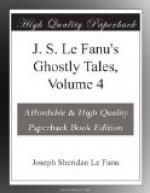The shuddering antipathy which our guest inspired did not rob his infernal homily of its effect. It was not a new or strange thing which he presented to our minds. There was an awful subtlety in the train of his suggestions. All that he had said had floated through my own mind before, without order, indeed, or shew of logic. From my own rebellious heart the same evil thoughts had risen, like pale apparitions hovering and lost in the fumes of a necromancer’s cauldron. His was like the summing up of all this—a reflection of my own feelings and fancies—but reduced to an awful order and definiteness, and clothed with a sophistical form of argument. The effect of it was powerful. It revived and exaggerated these bad emotions—it methodised and justified them—and gave to impulses and impressions, vague and desultory before, something of the compactness of a system.
My misfortune, therefore, did not soften, it exasperated me. I regarded the Great Disposer of events as a persecutor of the human race, who took delight in their miseries. I asked why my innocent child had been smitten down into the grave?—and why my darling wife, whose first object, I knew, had ever been to serve and glorify her Maker, should have been thus tortured and desolated by the cruelest calamity which the malignity of a demon could have devised? I railed and blasphemed, and even in my agony defied God with the impotent rage and desperation of a devil, in his everlasting torment.
In my bitterness, I could not forbear speaking these impenitent repetitions of the language of our nightly visitant, even in the presence of my wife. She heard me with agony, almost with terror. I pitied and loved her too much not to respect even her weaknesses—for so I characterised her humble submission to the chastisements of heaven. But even while I spared her reverential sensitiveness, the spectacle of her patience but enhanced my own gloomy and impenitent rage.
I was walking into town in this evil mood, when I was overtaken by the gentleman whom I had spoken with in the churchyard on the morning when my little boy was buried. I call him gentleman, but I could not say what was his rank—I never thought about it; there was a grace, a purity, a compassion, and a grandeur of intellect in his countenance, in his language, in his mien, that was beautiful and kinglike. I felt, in his company, a delightful awe, and an humbleness more gratifying than any elation of earthly pride.
He divined my state of feeling, but he said nothing harsh. He did not rebuke, but he reasoned with me—and oh! how mighty was that reasoning—without formality—without effort—as the flower grows and blossoms. Its process was in harmony with the successions of nature—gentle, spontaneous, irresistible.
At last he left me. I was grieved at his departure—I was wonder-stricken. His discourse had made me cry tears at once sweet and bitter; it had sounded depths I knew not of, and my heart was disquieted within me. Yet my trouble was happier than the resentful and defiant calm that had reigned within me before.




